Unit 5 复习提升课件【大单元教学】人教版七年级英语上册Unit 5 Do you have a soccer ball
文档属性
| 名称 | Unit 5 复习提升课件【大单元教学】人教版七年级英语上册Unit 5 Do you have a soccer ball | 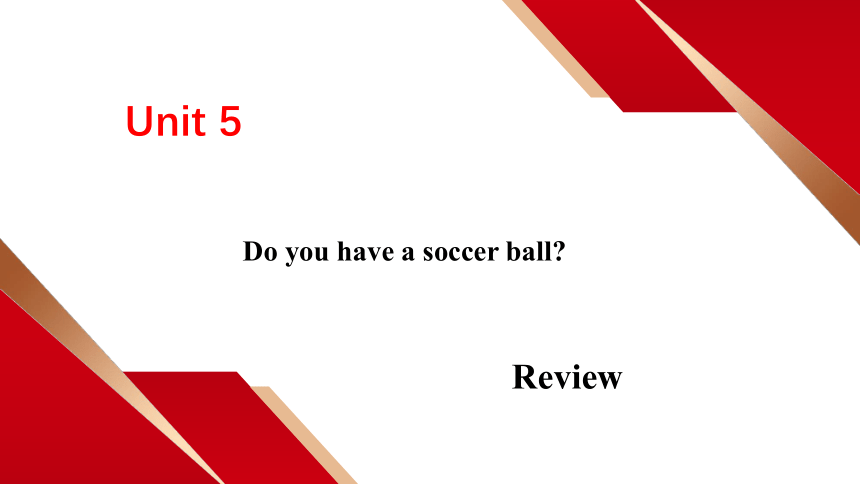 | |
| 格式 | pptx | ||
| 文件大小 | 2.5MB | ||
| 资源类型 | 试卷 | ||
| 版本资源 | 人教新目标(Go for it)版 | ||
| 科目 | 英语 | ||
| 更新时间 | 2023-09-21 12:42:56 | ||
图片预览

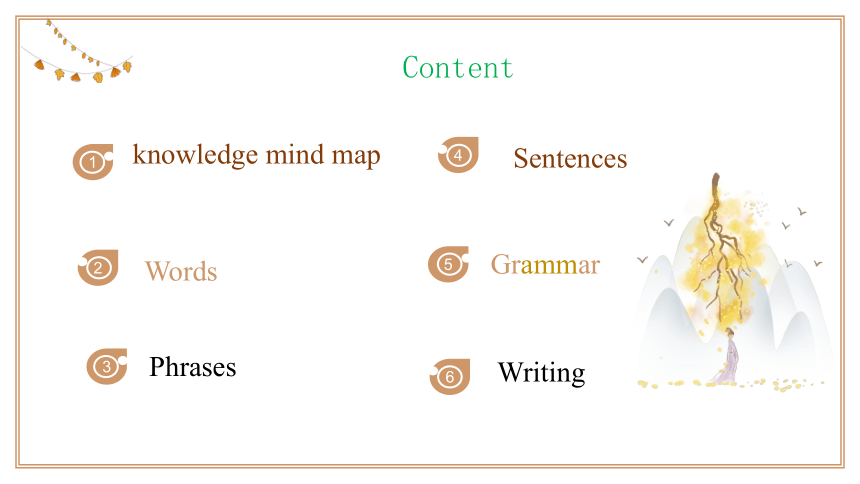
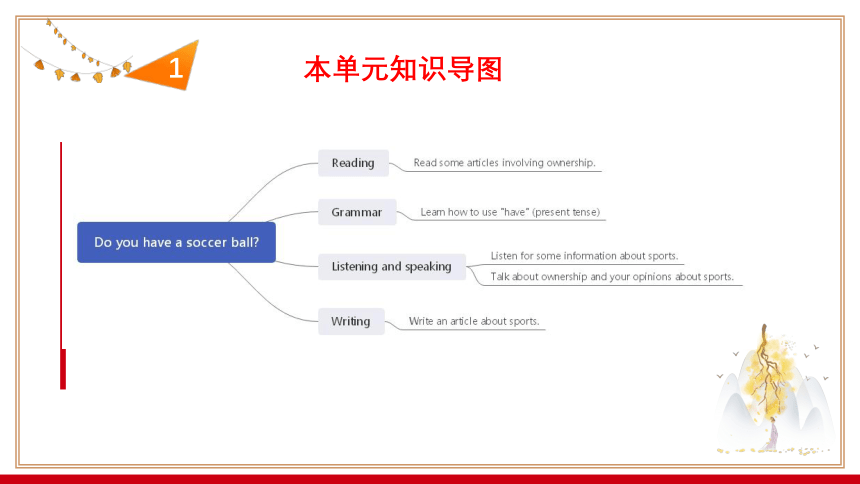
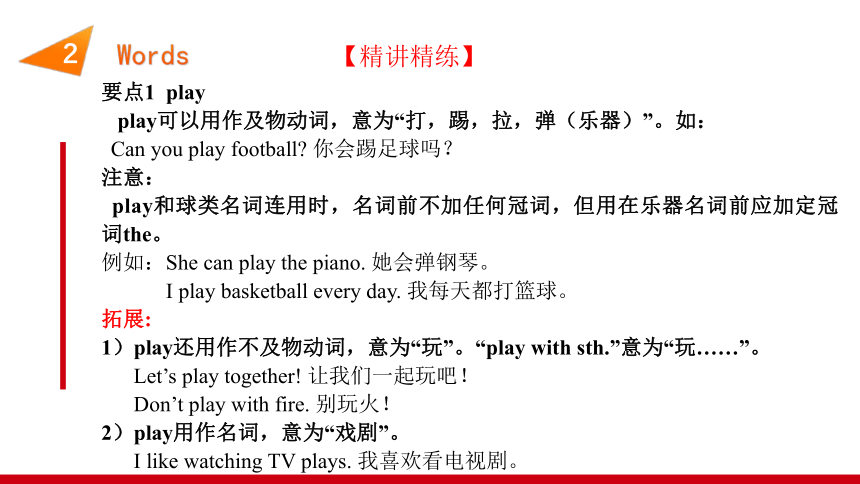
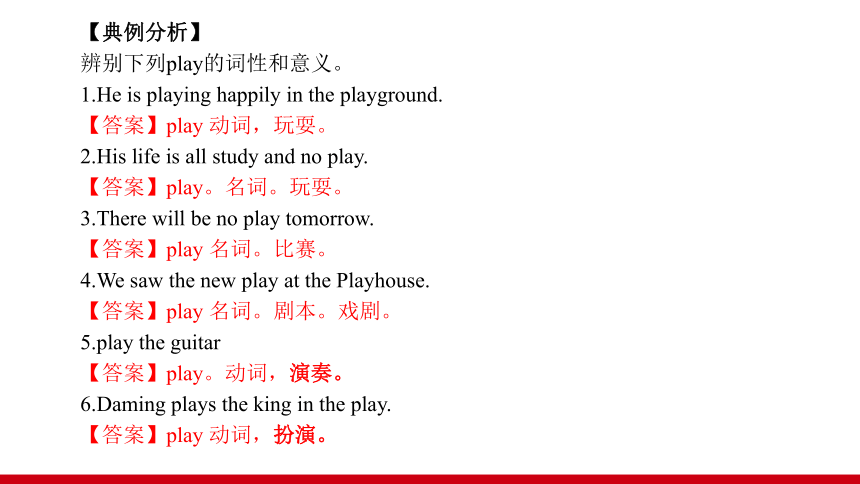
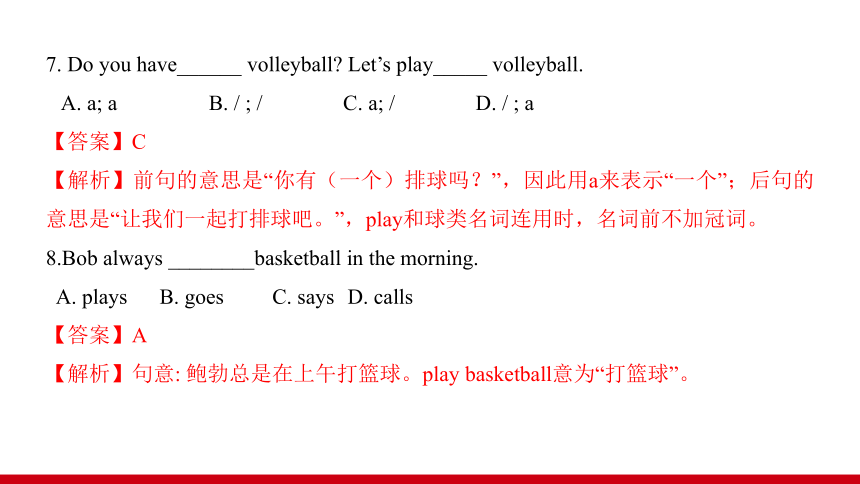
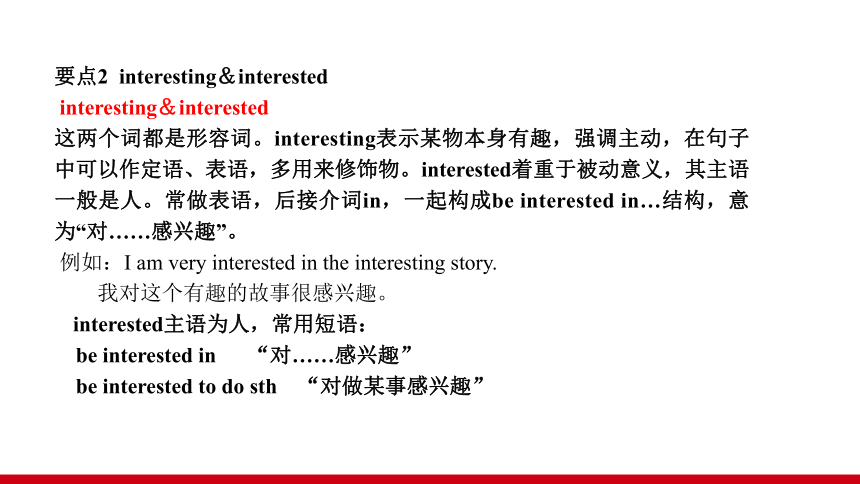
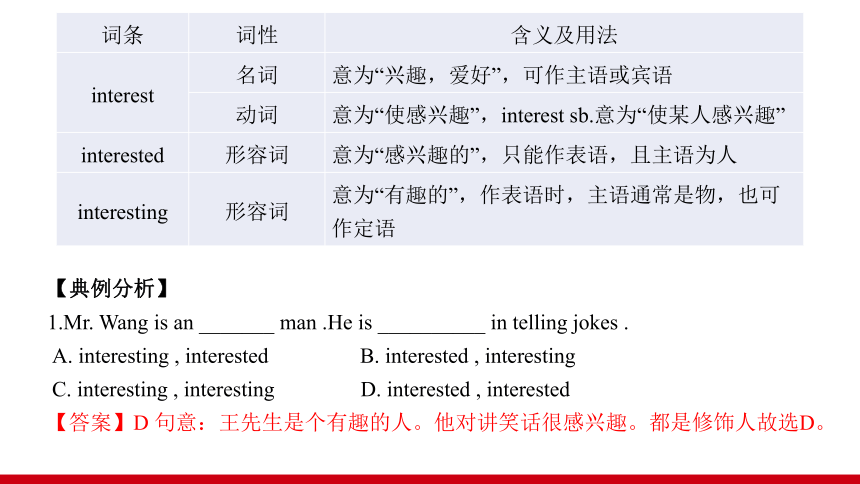
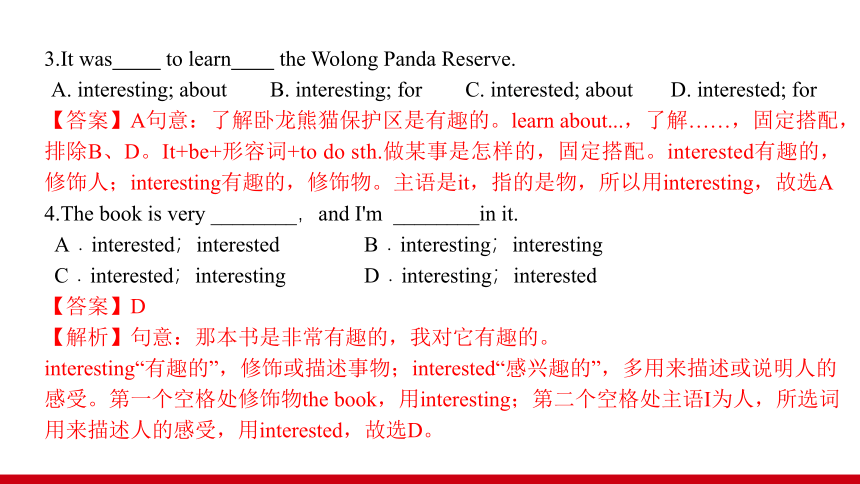
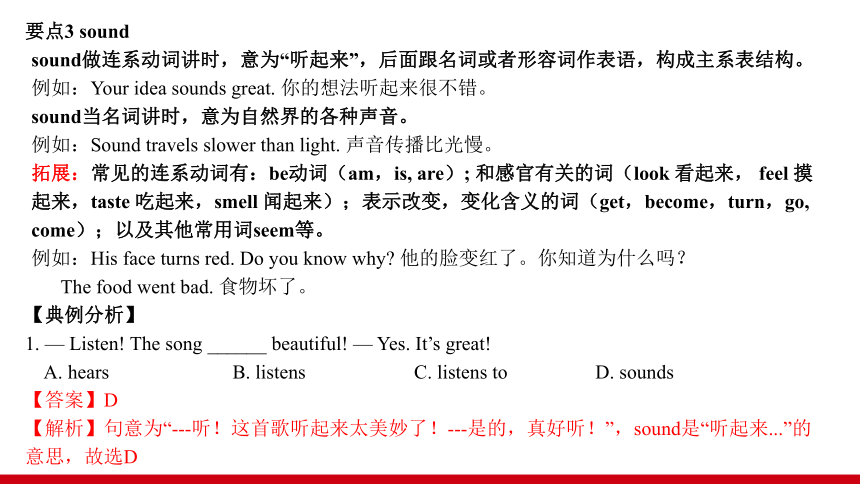
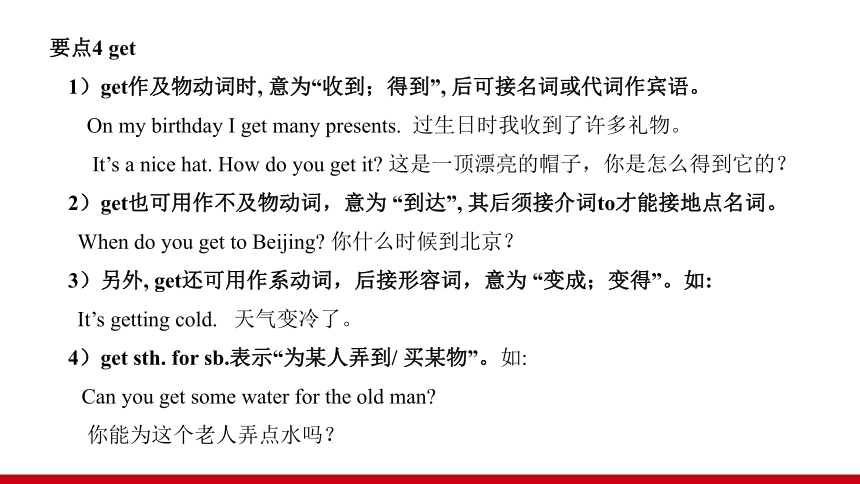
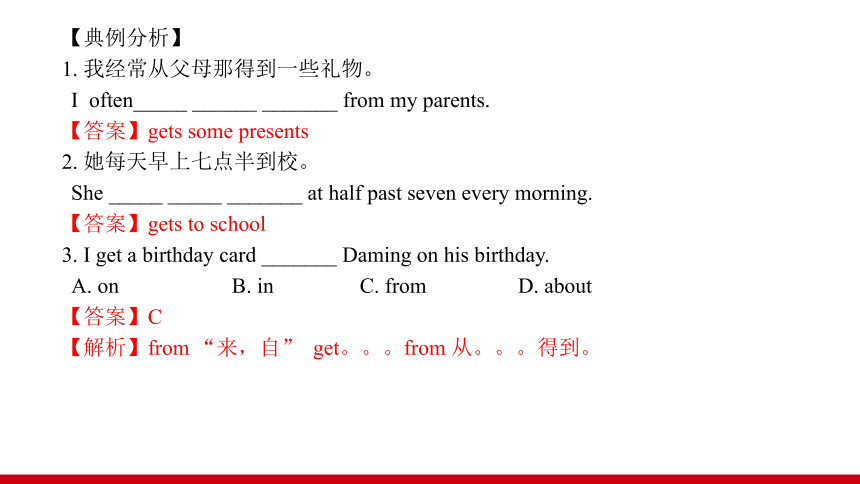
文档简介
(共43张PPT)
Unit 5
Review
Do you have a soccer ball
Words
1
Phrases
2
Sentences
3
4
Content
Writing
5
6
Grammar
knowledge mind map
本单元知识导图
1
Words
2
【精讲精练】
要点1 play
play可以用作及物动词,意为“打,踢,拉,弹(乐器)”。如:
Can you play football 你会踢足球吗?
注意:
play和球类名词连用时,名词前不加任何冠词,但用在乐器名词前应加定冠词the。
例如:She can play the piano. 她会弹钢琴。
I play basketball every day. 我每天都打篮球。
拓展:
1)play还用作不及物动词,意为“玩”。“play with sth.”意为“玩……”。
Let’s play together! 让我们一起玩吧!
Don’t play with fire. 别玩火!
2)play用作名词,意为“戏剧”。
I like watching TV plays. 我喜欢看电视剧。
【典例分析】
辨别下列play的词性和意义。
1.He is playing happily in the playground.
【答案】play 动词,玩耍。
2.His life is all study and no play.
【答案】play。名词。玩耍。
3.There will be no play tomorrow.
【答案】play 名词。比赛。
4.We saw the new play at the Playhouse.
【答案】play 名词。剧本。戏剧。
5.play the guitar
【答案】play。动词,演奏。
6.Daming plays the king in the play.
【答案】play 动词,扮演。
7. Do you have______ volleyball Let’s play_____ volleyball.
A. a; a B. / ; / C. a; / D. / ; a
【答案】C
【解析】前句的意思是“你有(一个)排球吗?”,因此用a来表示“一个”;后句的意思是“让我们一起打排球吧。”,play和球类名词连用时,名词前不加冠词。
8.Bob always ________basketball in the morning.
A. plays B. goes C. says D. calls
【答案】A
【解析】句意: 鲍勃总是在上午打篮球。play basketball意为“打篮球”。
要点2 interesting&interested
interesting&interested
这两个词都是形容词。interesting表示某物本身有趣,强调主动,在句子中可以作定语、表语,多用来修饰物。interested着重于被动意义,其主语一般是人。常做表语,后接介词in,一起构成be interested in…结构,意为“对……感兴趣”。
例如:I am very interested in the interesting story.
我对这个有趣的故事很感兴趣。
interested主语为人,常用短语:
be interested in “对……感兴趣”
be interested to do sth “对做某事感兴趣”
词条 词性 含义及用法
interest 名词 意为“兴趣,爱好”,可作主语或宾语
动词 意为“使感兴趣”,interest sb.意为“使某人感兴趣”
interested 形容词 意为“感兴趣的”,只能作表语,且主语为人
interesting 形容词 意为“有趣的”,作表语时,主语通常是物,也可作定语
【典例分析】
1.Mr. Wang is an _______ man .He is __________ in telling jokes .
A. interesting , interested B. interested , interesting
C. interesting , interesting D. interested , interested
【答案】D 句意:王先生是个有趣的人。他对讲笑话很感兴趣。都是修饰人故选D。
3.It was to learn the Wolong Panda Reserve.
A. interesting; about B. interesting; for C. interested; about D. interested; for
【答案】A句意:了解卧龙熊猫保护区是有趣的。learn about...,了解……,固定搭配,排除B、D。It+be+形容词+to do sth.做某事是怎样的,固定搭配。interested有趣的,修饰人;interesting有趣的,修饰物。主语是it,指的是物,所以用interesting,故选A
4.The book is very ________,and I'm ________in it.
A.interested;interested B.interesting;interesting
C.interested;interesting D.interesting;interested
【答案】D
【解析】句意:那本书是非常有趣的,我对它有趣的。
interesting“有趣的”,修饰或描述事物;interested“感兴趣的”,多用来描述或说明人的感受。第一个空格处修饰物the book,用interesting;第二个空格处主语I为人,所选词用来描述人的感受,用interested,故选D。
要点3 sound
sound做连系动词讲时,意为“听起来”,后面跟名词或者形容词作表语,构成主系表结构。
例如:Your idea sounds great. 你的想法听起来很不错。
sound当名词讲时,意为自然界的各种声音。
例如:Sound travels slower than light. 声音传播比光慢。
拓展:常见的连系动词有:be动词(am,is, are); 和感官有关的词(look 看起来, feel 摸起来,taste 吃起来,smell 闻起来);表示改变,变化含义的词(get,become,turn,go, come);以及其他常用词seem等。
例如:His face turns red. Do you know why 他的脸变红了。你知道为什么吗?
The food went bad. 食物坏了。
【典例分析】
1. — Listen! The song ______ beautiful! — Yes. It’s great!
A. hears B. listens C. listens to D. sounds
【答案】D
【解析】句意为“---听!这首歌听起来太美妙了!---是的,真好听!”,sound是“听起来...”的意思,故选D
要点4 get
1)get作及物动词时, 意为“收到;得到”, 后可接名词或代词作宾语。
On my birthday I get many presents. 过生日时我收到了许多礼物。
It’s a nice hat. How do you get it 这是一顶漂亮的帽子,你是怎么得到它的?
2)get也可用作不及物动词,意为 “到达”, 其后须接介词to才能接地点名词。
When do you get to Beijing 你什么时候到北京?
3)另外, get还可用作系动词,后接形容词,意为 “变成;变得”。如:
It’s getting cold. 天气变冷了。
4)get sth. for sb.表示“为某人弄到/ 买某物”。如:
Can you get some water for the old man
你能为这个老人弄点水吗?
【典例分析】
1. 我经常从父母那得到一些礼物。
I often_____ ______ _______ from my parents.
【答案】gets some presents
2. 她每天早上七点半到校。
She _____ _____ _______ at half past seven every morning.
【答案】gets to school
3. I get a birthday card _______ Daming on his birthday.
A. on B. in C. from D. about
【答案】C
【解析】from “来,自” get。。。from 从。。。得到。
要点 5 fun
fun adj. 有趣的,使人快乐的
fun还可以作名词,表示“乐趣,快乐”。作名词是不可数名词,常见搭配:
(1) have (great) fun 玩得(很)开
(2) have fun doing sth 做某事很开心
(3)for fun 闹着玩地;为了好玩
如:Every has great fun on the trip. 每个人在旅途中都玩得开心。
I learn piano just for fun. 我学钢琴只是为了好玩。
fun 形容词 意为“逗乐的;有趣的;使人快乐的” 不做表语。
不可数名词 意为“乐趣; 享乐的事”, have fun意为“玩得高兴, 过得快乐”
funny 形容词 意为 “滑稽的 好笑的;奇怪的“
【妙辨异同】 fun与funny
fun指任何能给予喜悦的娱乐,或指娱乐本身。funny主要强调引人发笑的效果。
【典例分析】
1.We had fun ___________(ride) our bicycles to the beach today
【答案】riding have fun doing 做。。。很有趣。
2.用fun ,funny 填空
1)I am not saying it for _________
2)The story was very _________
3)The joke is not _________
4)Diving is a __________ thing to do.
5) My sister is a __________person
6)Why don't you come with us It’ll be great ____________.
【答案】1)fun 名词。趣事。 2)funny 滑稽的 好笑的 3)funny 滑稽的 好笑的 注意funny可以做表语而fun不做表语。 4.funny/fun funny着重强调“好笑的。” Fun 着重强调“快乐的”5.funny/fun 6.fun 这里fun名词。
要点6 like
1. like 动词,意为“喜欢,喜爱”。后面可以跟名词或者代词作宾语,也可以跟动词不定式(to do)或者动名词(doing)作宾语。跟“to do”做宾语时,表示某一次的行为倾向,跟“doing”做宾语时表示一种习惯或者爱好。
例如:I like English. 我喜欢英语。(名词作宾语)
Usually I like doing my homework after supper, but today I like to watch TV.
我通常喜欢晚饭后做作业,但是今天我想看电视。(动名词和动词不定式做宾语)
2.like 介词,意为“像;与……相似”,对应的反义词为unlike。短语look like表示“看起来像……”。反义词是unlike。
例如:Draw it like this! 照这样画!
She looks like her mother. 她长得像她妈妈。
3.like还可以作名词,表示“爱好,喜好”,常用于复数形式,它的反义词是dislike。
例如:Please tell me your likes and dislikes. 请告诉我你的好恶。
要点7
have 的用法
1.动词“have”意为“有”,表示拥有关系,有人称和数的变化,当主语是“I, we, you, they”或名词复数时,就与“have”搭配。如:
My parents have a computer.我父母有一台电脑。
I have an English book. 我有一本英语书。
2.当主语是第三人称单数或者单数名词时,表示拥有要用has。
例如:She has a brother. 她有一个弟弟。
Tom has a new bike. 汤姆有一部新自行车。
“have”的否定式是“don’t have”; “has” 的否定式是“doesn’t have”。
例如:We don’t have a house. 我们没有房子。
She doesn’t have a car. 他没有小汽车。
拓展have还有很多别的意思,构成短语不是表示“拥有”的意义,在学习中特别注意。
have作为“吃”讲时,常与三餐构成动词词组:have breakfast/lunch/supper 吃(早饭/午饭/晚饭);作为“喝”讲时,构成短语have a drink(=drink)。
作为“进行,举行”讲时,构成如下短语:
have a lesson 上课 have a birthday party 举办生日宴会
3)作为“经历”讲时,构成:
have a good time(玩得开心)= have fun;have a summer holiday 过暑假
一、翻译下面have构成的短语。
1.have a meeting 2. have a party
3.have breakfast 4. have a look
5.have a class 6.have a good time
7.have a talk 8.have a swim
9.have a rest 10.have a walk
11.have a game 12.have a picnic
【答案】1.开会 2.举行聚会 3.吃早饭 4.看一看 5.上课 6.过得愉快 7.交谈 8. 游泳 9.休息一下 10.散步 11.进行一次比赛 12. 吃野餐
要点8 let
let的用法
let意为“让,允许”, 表示 “让(允许)某人做某事”应该说“let somebody do something”,不能说“let somebody to do something”。如:
Let me help you. 让我帮助你。
His mother doesn’t let him go out at night. 他母亲不让他晚上出去。
“Let’s…”是表示建议或请求的祈使句句型,“Let’s”是“Let us”的缩写形式。
例如:Let’s go to school. 咱们上学吧。
Let’s play basketball after school. 咱们放学后打篮球吧。
拓展:Let’s 与Let us在用法上略有区别
在表示向对方提出建议,涉及双方的共同行为时,“Let us”可以缩写成“Let’s”;而表示请求对方允许做某事,不涉及对方行为时,“Let us”不能缩写成“Let’s”。
例如:Let’s (=Let us) play sports. 咱们做运动吧。
Let us know your telephone number. 请把你的电话号码告诉我们。
(Let us 不能缩写成Let’s)
【典例分析】
1. — Let’s _______. — OK.
A. to play basketball B. to play the basketball C. play basketball D. play the basketball
【答案】C
【解析】let’s后面跟动词原形,所以排除A,B,play basketball中间不能加冠词the,故选C
2.—Let's watch TV. —______.
A.Sorry,I don't B.That's a good idea C.Yes,I do D.No,I don't
【答案】B
【解析】点拨:考查交际用语。对别人的提议或建议表示赞同或支持时,应说“Good idea.” “That's a good idea.” “OK.”等来应答。故选B项。
3.—Let’s watch a basketball game. —________.
A.I see B. You’re welcome C. That sounds good D. Nice to see you
【答案】C
【解析】句意:“我们看一场篮球比赛吧。”“听起来不错。”“Let’s…”是表示提建议的句型,结合选项可知应该用“That sounds good.”回答。
要点 9 and和but 用法
(1) and 意为“和;并且”,表示并列关系。
例如:肉和鱼是健康食物。Meat and fish are healthy food.
(2)but 转折关系。
例如:他很努力学习,但是这次考试还是没及格。
He studies hard, but he failed in this exam.
拓展
(3) so意为“因此”,表示因果关系。
例如:它有两个翅膀,因此它会飞。 It has two wings, so it can fly.
(4) or意为“或者”,表示选择关系。or意为“或者,否则”,做“和,并且”讲时常用于否定句中。
例如:你喜欢米饭还是面包? Do you like rice or bread
I don't like apples or bananas. 我不喜欢苹果和香蕉。
1.—Which do you prefer(更喜欢), tea coffee
—Tea, please.
A. but B. so C. or D. and
【答案】D
【解析】可用“词义辨析法”解题。but但是,转折关系;so 所以,因果关系;or或者,选择关系;and和、又,并列关系。由答语“请给我茶”可知,此处是选择关系,故选C。
2. I can play the guitar, __________ I can’t play it well.
A. or B. and C. but D. so
【答案】C
【解析】句意:我会弹吉他,但是我弹得不好。A. or 或者; B. and和; C. but 但是; D. so因此;根据句意故选C
3.The film seems interesting ______ we all want to see it.
A. and B. but C. unless D. if
【答案】A
【解析】句意:这个电影好像有趣,我们都想看它。根据and和,表示递进; but但是, unless除非,if是否,如果;根据The film seems interesting和we all want to see it之间是递进关系;故选A。
4.Emily, you are playing video games again! Study hard, ______ you will fail in the coming exam.
A. then B. so C. and D. or
【答案】D
【解析】句意:艾米丽,你又在玩电子游戏了!努力学习吧,否则你在接下来的考试中会不及格的。考查连词辨析。then然后,表顺承;so所以,表结果;and和,表并列;or否则,表条件。本句是“祈使句+or+陈述句”固定句型,表示在以祈使句为条件下的相反假设,意为“否则,要不然”。根据句意结构和语境,可知选D。
要点10 late
late形容词
1) 迟的,晚的
I was late for school. 我上学迟到了。
常见短语:be late for迟到
2) 晚期的, 末期的
He began the work in late May. 他在五月底开始这项工作。
2. 副词 迟,晚
I got up late. 我起晚了。
【典例分析】
1. Hurry up (快点) , Mary! We’re _______!
A. late B. great C. good D. tidy
【答案】A
【解析】句意为“快一点,玛丽!我们要迟到了”,故选A
2. 赶快,否则你上学就要迟到了
Hurry up. or you'll ________ _______ _______ school.
【答案】be late for 为。。。迟到。
3.他傍晚才来
He came in the _________ ______________ .
【答案】late afternoon late这里做形容词用。
4.我们很晚才上床。
We go to bed ___________.
【答案】late 副词修饰动词。
要点11
same adj. 相同的
1.常用短语:the same as 与...相同
2.反义词:different adj. 不同的 be different from 与...不同
3.same与the连用,后面接名词单数形式
【典例分析】
1.我的书包和你的书包一样。
My bag _______________ yours.
【答案】is the same as 与。。。相同。固定搭配。
2.我的钢笔和你的不一样。
My pen _________________yours.
【答案】is different from。与。。。不相同。
3. They are in______ school.
A. same B. the same C. a same D. an same
【答案】B
【解析】考查形容词same的用法。same前须加the。
要点12
sport名词,意为“体育运动”,常用短语:has/have sports=play sports=do sports意为“做运动; 参加体育运动或比赛"
例:Soccer and volleyball are good sports. 足球和排球是很好的运动。
I play sports everyday. 我每天都做运动,
We have sports at school after class. 我们课后在学校进行体育运动。
小贴士
sport作定语时,常用其复数形式。
sports shoes 运动鞋 sports meeting 运动会
【典例分析】
1.—Do you like basketball, Michael
—Yes. It is my favorite ________.
color B. sport C. friend D. teacher
【答案】B
【解析】句意:“迈克尔,你喜欢篮球吗 ”“是的,它是我最喜爱的运动。”sport意为“体育运动”。
2. His mum buys him ________shoes as his birthday gift.
A. sports B. sport C. sporting
【答案】A
【解析】sport 名词作定语常用复数形式。
Phrases
3
1. 玩电脑游戏
2. 一个棒球棒
3. 迟到
4. 和某人玩某物
5. 打网球
6. 在学校
7. 下课后
8. 喜爱运动
9. 听起来不错
10. 去学校
play computer games
a baseball bat
be late
play sth. with sb
play tennis
at school
after class
love sports
sounds good
go to school
Sentences
4
1. —Do they have a computer 他们有一台电脑吗?
—Yes, they do. /No, they don't. 是的,他们有。/不,他们没有。
2 .—Does he have a tennis ball
他有一个网球吗?
—Yes,he does. /No, he doesn’t.是的,他有。/不,他没有。
3. He has two ping-pong bats.
他有两个乒乓球拍。
4. They have a computer.
他们有一台电脑。
5. I don't have a soccer ball, but my brother does.
我没有足球,但是我兄弟有。
6. She doesn’t have a volleyball.
她没有排球。
7. Let’s play basketball!
让我们(一起)去打篮球吧!
That sounds interesting. 那听起来很有趣。
8. That sounds good.
那听起来不错哦。
9. We go to the same school and we love soccer.
我们去同一所学校上学,我们热爱足球。
10. We play soccer at school with our friends. It’s relaxing.
我们在学校里和朋友踢足球。这很放松。
Grammar
5
一般现在时中have的用法。
用法
Have意为“有”,表示所属关系,有人称和数的变化。其主语大多数情况是人,有时也可以是物。
句式
肯定句:主语+ have/has+其他。
I have a new watch.
否定句:主语+don’t/doesn’t have + 其他。He doesn’t have a pen.
一般疑问句:Do/Does + 主语+have +其他?肯定回答:Yes, 主语+do/does.否定回答No, 主语+don’t/doesn’t.
---Do you have a basketball ---Yes, I do. /No, I don’t.
特殊疑问句:特殊疑问词+一般疑问句? What does your brother have
1. You ____ a new coat, but your brother ___.
A. have; don’t have one B. don’t have; does C. have; does
【答案】B
【解析】有个but,所以前后意思是相反的,排除C,又因为your brother是第三人称单数,所以后面不能跟don’t,故选B
2. Susan likes tennis, but she______ a tennis racket.
A. don’t have B. aren’t have C. doesn’t D. doesn’t have
【答案】D
【解析】句意为“Susan喜欢网球,但她没有网球拍。”,主语是第三人称单数,故选D
3.— _______ you have a volleyball
— No, I _____. But my sister ____ a new one.
A. Do; don’t; have B. Do; don’t; has
C. Does; doesn’t; have D. Does; doesn’t; has
【答案】B
【解析】一般现在时,主语是you所以助动词用do,否定回答中,主语是I,所以用don’t,my sister是第三人称单数,所以后面用has,故选B
4. — _______ Anna _______ a ping-pong bat
— Yes, she _______.
A. Do; have; do B. Does; have; does
C. Do; have; has D. Does; have; has
【答案】B
【解析】主语Anna是第三人称单数,所以助动词用does,有了助动词does,主要动词用原形have,肯定回答用does,故选B
5. My mother ______sports, she only ______ them on TV.
A. doesn’t play; watches B. not play; watches
C. don’t play; watch D. doesn’t play; watch
【答案】A
【解析】play是行为动词,因此应该用助动词否定,故排除B项。又因为前后句主语均是第三人称单数,因此排除C,D项。
6.—Does Lily have a nice and tidy room
—________.You know she’s a tidy girl.
A. Yes, she is B .No, she isn’t
C. Yes, she does D. No, she doesn’t
【答案】C
【解析】句意:“莉莉的房间干净整洁吗 ”“是的。你知道她是个爱整洁的女孩。”由“You know she’s a tidy girl.”可知,空格中用肯定回答;问句用does提问,答语用does回答。
Writing
6
【话题分析】
本单元的话题是“与朋友共度快乐时光”。要求我们能用英语谈论体育用品及体育活动。要求介绍一下自己或他人对体育用品的收藏和进行体育锻炼的情况,并简单阐述对某项运动的观点;也可介绍自己喜欢或不喜欢的体育运动,并说明理由。
【素材积累】
Ⅰ.高频短语
1.和我们一起 ________________
2.喜爱足球 ________________
3.看电视 ________________
4.做运动 ________________
5.打篮球 ________________
6.一个好玩的游戏 ________________
7.迟到 ________________
8.上同一所学校 ________________
9.在电视上看…… ________________
10.在学校 ________________
with us
love soccer
watch TV
do/play sports
play basketball
an interesting/a fun game
be late
go to the same school
watch…on TV
at school
Ⅱ.经典句型
11.他和我在同一所学校。(the same)
12.我不喜欢(踢)足球,但是她喜欢。(but)
13.他有两个排球。(has)
14.我认为(打)乒乓球容易。(think, easy)
15.放学后,我和我的同班同学们打乒乓球。 (after school)
He and I are in the same school.
I don’t like soccer, but she does.
He has two volleyballs.
I think ping-pong is easy.
After school, I play ping-pong with my classmates.
16.我爸爸每天做运动。
17.这对我来说很困难。
18.篮球令人感兴趣,但棒球让人觉得无聊。
19.我经常在电视上看排球賽。
20.我们是同学,在同一个班级。
My father plays sports every day.
It is difficult for me.
Basetball is interesting but baseball is boring.
I often watch volleyball game on TV.
We are classmates in the same class.
Ⅲ.典句仿写
21.He likes English.
仿句: 他喜欢运动。
____________________________________________________________________
22.She often watches TV with her sister after school.
仿句: 放学后他经常和他的同班同学们打篮球。
____________________________________________________________________
23.It’s not easy for us.
仿句: 对他来说它非常难。
____________________________________________________________________
He likes sports.
He often plays basketball with his classmates after school.
It’s very difficult for him.
【实战演练】
根据表格提示,写一篇60词左右的英语短文,介绍一下你的好朋友Bill的爱好、收藏品、喜欢和不喜欢的运动及原因。
My friend Bill 爱好 运动
收藏品 三个篮球
喜欢 篮球(有趣、容易);放学后和同班同学们一起打篮球
不喜欢 足球(太难);不踢足球;只在电视上看
I have a good friend. He is Bill. He is 14 years old now. He is an English boy. But now he lives in Beijing. He likes sports. He has three basketballs. He likes basketball. He thinks it is interesting and easy. He often plays basketball with his classmates after school. He doesn’t like soccer. It’s very difficult for him. He doesn’t play soccer. He only watches soccer games on TV.
全力以赴,绽放未来
Go All Out, Bloom the Future
谢
谢
Unit 5
Review
Do you have a soccer ball
Words
1
Phrases
2
Sentences
3
4
Content
Writing
5
6
Grammar
knowledge mind map
本单元知识导图
1
Words
2
【精讲精练】
要点1 play
play可以用作及物动词,意为“打,踢,拉,弹(乐器)”。如:
Can you play football 你会踢足球吗?
注意:
play和球类名词连用时,名词前不加任何冠词,但用在乐器名词前应加定冠词the。
例如:She can play the piano. 她会弹钢琴。
I play basketball every day. 我每天都打篮球。
拓展:
1)play还用作不及物动词,意为“玩”。“play with sth.”意为“玩……”。
Let’s play together! 让我们一起玩吧!
Don’t play with fire. 别玩火!
2)play用作名词,意为“戏剧”。
I like watching TV plays. 我喜欢看电视剧。
【典例分析】
辨别下列play的词性和意义。
1.He is playing happily in the playground.
【答案】play 动词,玩耍。
2.His life is all study and no play.
【答案】play。名词。玩耍。
3.There will be no play tomorrow.
【答案】play 名词。比赛。
4.We saw the new play at the Playhouse.
【答案】play 名词。剧本。戏剧。
5.play the guitar
【答案】play。动词,演奏。
6.Daming plays the king in the play.
【答案】play 动词,扮演。
7. Do you have______ volleyball Let’s play_____ volleyball.
A. a; a B. / ; / C. a; / D. / ; a
【答案】C
【解析】前句的意思是“你有(一个)排球吗?”,因此用a来表示“一个”;后句的意思是“让我们一起打排球吧。”,play和球类名词连用时,名词前不加冠词。
8.Bob always ________basketball in the morning.
A. plays B. goes C. says D. calls
【答案】A
【解析】句意: 鲍勃总是在上午打篮球。play basketball意为“打篮球”。
要点2 interesting&interested
interesting&interested
这两个词都是形容词。interesting表示某物本身有趣,强调主动,在句子中可以作定语、表语,多用来修饰物。interested着重于被动意义,其主语一般是人。常做表语,后接介词in,一起构成be interested in…结构,意为“对……感兴趣”。
例如:I am very interested in the interesting story.
我对这个有趣的故事很感兴趣。
interested主语为人,常用短语:
be interested in “对……感兴趣”
be interested to do sth “对做某事感兴趣”
词条 词性 含义及用法
interest 名词 意为“兴趣,爱好”,可作主语或宾语
动词 意为“使感兴趣”,interest sb.意为“使某人感兴趣”
interested 形容词 意为“感兴趣的”,只能作表语,且主语为人
interesting 形容词 意为“有趣的”,作表语时,主语通常是物,也可作定语
【典例分析】
1.Mr. Wang is an _______ man .He is __________ in telling jokes .
A. interesting , interested B. interested , interesting
C. interesting , interesting D. interested , interested
【答案】D 句意:王先生是个有趣的人。他对讲笑话很感兴趣。都是修饰人故选D。
3.It was to learn the Wolong Panda Reserve.
A. interesting; about B. interesting; for C. interested; about D. interested; for
【答案】A句意:了解卧龙熊猫保护区是有趣的。learn about...,了解……,固定搭配,排除B、D。It+be+形容词+to do sth.做某事是怎样的,固定搭配。interested有趣的,修饰人;interesting有趣的,修饰物。主语是it,指的是物,所以用interesting,故选A
4.The book is very ________,and I'm ________in it.
A.interested;interested B.interesting;interesting
C.interested;interesting D.interesting;interested
【答案】D
【解析】句意:那本书是非常有趣的,我对它有趣的。
interesting“有趣的”,修饰或描述事物;interested“感兴趣的”,多用来描述或说明人的感受。第一个空格处修饰物the book,用interesting;第二个空格处主语I为人,所选词用来描述人的感受,用interested,故选D。
要点3 sound
sound做连系动词讲时,意为“听起来”,后面跟名词或者形容词作表语,构成主系表结构。
例如:Your idea sounds great. 你的想法听起来很不错。
sound当名词讲时,意为自然界的各种声音。
例如:Sound travels slower than light. 声音传播比光慢。
拓展:常见的连系动词有:be动词(am,is, are); 和感官有关的词(look 看起来, feel 摸起来,taste 吃起来,smell 闻起来);表示改变,变化含义的词(get,become,turn,go, come);以及其他常用词seem等。
例如:His face turns red. Do you know why 他的脸变红了。你知道为什么吗?
The food went bad. 食物坏了。
【典例分析】
1. — Listen! The song ______ beautiful! — Yes. It’s great!
A. hears B. listens C. listens to D. sounds
【答案】D
【解析】句意为“---听!这首歌听起来太美妙了!---是的,真好听!”,sound是“听起来...”的意思,故选D
要点4 get
1)get作及物动词时, 意为“收到;得到”, 后可接名词或代词作宾语。
On my birthday I get many presents. 过生日时我收到了许多礼物。
It’s a nice hat. How do you get it 这是一顶漂亮的帽子,你是怎么得到它的?
2)get也可用作不及物动词,意为 “到达”, 其后须接介词to才能接地点名词。
When do you get to Beijing 你什么时候到北京?
3)另外, get还可用作系动词,后接形容词,意为 “变成;变得”。如:
It’s getting cold. 天气变冷了。
4)get sth. for sb.表示“为某人弄到/ 买某物”。如:
Can you get some water for the old man
你能为这个老人弄点水吗?
【典例分析】
1. 我经常从父母那得到一些礼物。
I often_____ ______ _______ from my parents.
【答案】gets some presents
2. 她每天早上七点半到校。
She _____ _____ _______ at half past seven every morning.
【答案】gets to school
3. I get a birthday card _______ Daming on his birthday.
A. on B. in C. from D. about
【答案】C
【解析】from “来,自” get。。。from 从。。。得到。
要点 5 fun
fun adj. 有趣的,使人快乐的
fun还可以作名词,表示“乐趣,快乐”。作名词是不可数名词,常见搭配:
(1) have (great) fun 玩得(很)开
(2) have fun doing sth 做某事很开心
(3)for fun 闹着玩地;为了好玩
如:Every has great fun on the trip. 每个人在旅途中都玩得开心。
I learn piano just for fun. 我学钢琴只是为了好玩。
fun 形容词 意为“逗乐的;有趣的;使人快乐的” 不做表语。
不可数名词 意为“乐趣; 享乐的事”, have fun意为“玩得高兴, 过得快乐”
funny 形容词 意为 “滑稽的 好笑的;奇怪的“
【妙辨异同】 fun与funny
fun指任何能给予喜悦的娱乐,或指娱乐本身。funny主要强调引人发笑的效果。
【典例分析】
1.We had fun ___________(ride) our bicycles to the beach today
【答案】riding have fun doing 做。。。很有趣。
2.用fun ,funny 填空
1)I am not saying it for _________
2)The story was very _________
3)The joke is not _________
4)Diving is a __________ thing to do.
5) My sister is a __________person
6)Why don't you come with us It’ll be great ____________.
【答案】1)fun 名词。趣事。 2)funny 滑稽的 好笑的 3)funny 滑稽的 好笑的 注意funny可以做表语而fun不做表语。 4.funny/fun funny着重强调“好笑的。” Fun 着重强调“快乐的”5.funny/fun 6.fun 这里fun名词。
要点6 like
1. like 动词,意为“喜欢,喜爱”。后面可以跟名词或者代词作宾语,也可以跟动词不定式(to do)或者动名词(doing)作宾语。跟“to do”做宾语时,表示某一次的行为倾向,跟“doing”做宾语时表示一种习惯或者爱好。
例如:I like English. 我喜欢英语。(名词作宾语)
Usually I like doing my homework after supper, but today I like to watch TV.
我通常喜欢晚饭后做作业,但是今天我想看电视。(动名词和动词不定式做宾语)
2.like 介词,意为“像;与……相似”,对应的反义词为unlike。短语look like表示“看起来像……”。反义词是unlike。
例如:Draw it like this! 照这样画!
She looks like her mother. 她长得像她妈妈。
3.like还可以作名词,表示“爱好,喜好”,常用于复数形式,它的反义词是dislike。
例如:Please tell me your likes and dislikes. 请告诉我你的好恶。
要点7
have 的用法
1.动词“have”意为“有”,表示拥有关系,有人称和数的变化,当主语是“I, we, you, they”或名词复数时,就与“have”搭配。如:
My parents have a computer.我父母有一台电脑。
I have an English book. 我有一本英语书。
2.当主语是第三人称单数或者单数名词时,表示拥有要用has。
例如:She has a brother. 她有一个弟弟。
Tom has a new bike. 汤姆有一部新自行车。
“have”的否定式是“don’t have”; “has” 的否定式是“doesn’t have”。
例如:We don’t have a house. 我们没有房子。
She doesn’t have a car. 他没有小汽车。
拓展have还有很多别的意思,构成短语不是表示“拥有”的意义,在学习中特别注意。
have作为“吃”讲时,常与三餐构成动词词组:have breakfast/lunch/supper 吃(早饭/午饭/晚饭);作为“喝”讲时,构成短语have a drink(=drink)。
作为“进行,举行”讲时,构成如下短语:
have a lesson 上课 have a birthday party 举办生日宴会
3)作为“经历”讲时,构成:
have a good time(玩得开心)= have fun;have a summer holiday 过暑假
一、翻译下面have构成的短语。
1.have a meeting 2. have a party
3.have breakfast 4. have a look
5.have a class 6.have a good time
7.have a talk 8.have a swim
9.have a rest 10.have a walk
11.have a game 12.have a picnic
【答案】1.开会 2.举行聚会 3.吃早饭 4.看一看 5.上课 6.过得愉快 7.交谈 8. 游泳 9.休息一下 10.散步 11.进行一次比赛 12. 吃野餐
要点8 let
let的用法
let意为“让,允许”, 表示 “让(允许)某人做某事”应该说“let somebody do something”,不能说“let somebody to do something”。如:
Let me help you. 让我帮助你。
His mother doesn’t let him go out at night. 他母亲不让他晚上出去。
“Let’s…”是表示建议或请求的祈使句句型,“Let’s”是“Let us”的缩写形式。
例如:Let’s go to school. 咱们上学吧。
Let’s play basketball after school. 咱们放学后打篮球吧。
拓展:Let’s 与Let us在用法上略有区别
在表示向对方提出建议,涉及双方的共同行为时,“Let us”可以缩写成“Let’s”;而表示请求对方允许做某事,不涉及对方行为时,“Let us”不能缩写成“Let’s”。
例如:Let’s (=Let us) play sports. 咱们做运动吧。
Let us know your telephone number. 请把你的电话号码告诉我们。
(Let us 不能缩写成Let’s)
【典例分析】
1. — Let’s _______. — OK.
A. to play basketball B. to play the basketball C. play basketball D. play the basketball
【答案】C
【解析】let’s后面跟动词原形,所以排除A,B,play basketball中间不能加冠词the,故选C
2.—Let's watch TV. —______.
A.Sorry,I don't B.That's a good idea C.Yes,I do D.No,I don't
【答案】B
【解析】点拨:考查交际用语。对别人的提议或建议表示赞同或支持时,应说“Good idea.” “That's a good idea.” “OK.”等来应答。故选B项。
3.—Let’s watch a basketball game. —________.
A.I see B. You’re welcome C. That sounds good D. Nice to see you
【答案】C
【解析】句意:“我们看一场篮球比赛吧。”“听起来不错。”“Let’s…”是表示提建议的句型,结合选项可知应该用“That sounds good.”回答。
要点 9 and和but 用法
(1) and 意为“和;并且”,表示并列关系。
例如:肉和鱼是健康食物。Meat and fish are healthy food.
(2)but 转折关系。
例如:他很努力学习,但是这次考试还是没及格。
He studies hard, but he failed in this exam.
拓展
(3) so意为“因此”,表示因果关系。
例如:它有两个翅膀,因此它会飞。 It has two wings, so it can fly.
(4) or意为“或者”,表示选择关系。or意为“或者,否则”,做“和,并且”讲时常用于否定句中。
例如:你喜欢米饭还是面包? Do you like rice or bread
I don't like apples or bananas. 我不喜欢苹果和香蕉。
1.—Which do you prefer(更喜欢), tea coffee
—Tea, please.
A. but B. so C. or D. and
【答案】D
【解析】可用“词义辨析法”解题。but但是,转折关系;so 所以,因果关系;or或者,选择关系;and和、又,并列关系。由答语“请给我茶”可知,此处是选择关系,故选C。
2. I can play the guitar, __________ I can’t play it well.
A. or B. and C. but D. so
【答案】C
【解析】句意:我会弹吉他,但是我弹得不好。A. or 或者; B. and和; C. but 但是; D. so因此;根据句意故选C
3.The film seems interesting ______ we all want to see it.
A. and B. but C. unless D. if
【答案】A
【解析】句意:这个电影好像有趣,我们都想看它。根据and和,表示递进; but但是, unless除非,if是否,如果;根据The film seems interesting和we all want to see it之间是递进关系;故选A。
4.Emily, you are playing video games again! Study hard, ______ you will fail in the coming exam.
A. then B. so C. and D. or
【答案】D
【解析】句意:艾米丽,你又在玩电子游戏了!努力学习吧,否则你在接下来的考试中会不及格的。考查连词辨析。then然后,表顺承;so所以,表结果;and和,表并列;or否则,表条件。本句是“祈使句+or+陈述句”固定句型,表示在以祈使句为条件下的相反假设,意为“否则,要不然”。根据句意结构和语境,可知选D。
要点10 late
late形容词
1) 迟的,晚的
I was late for school. 我上学迟到了。
常见短语:be late for迟到
2) 晚期的, 末期的
He began the work in late May. 他在五月底开始这项工作。
2. 副词 迟,晚
I got up late. 我起晚了。
【典例分析】
1. Hurry up (快点) , Mary! We’re _______!
A. late B. great C. good D. tidy
【答案】A
【解析】句意为“快一点,玛丽!我们要迟到了”,故选A
2. 赶快,否则你上学就要迟到了
Hurry up. or you'll ________ _______ _______ school.
【答案】be late for 为。。。迟到。
3.他傍晚才来
He came in the _________ ______________ .
【答案】late afternoon late这里做形容词用。
4.我们很晚才上床。
We go to bed ___________.
【答案】late 副词修饰动词。
要点11
same adj. 相同的
1.常用短语:the same as 与...相同
2.反义词:different adj. 不同的 be different from 与...不同
3.same与the连用,后面接名词单数形式
【典例分析】
1.我的书包和你的书包一样。
My bag _______________ yours.
【答案】is the same as 与。。。相同。固定搭配。
2.我的钢笔和你的不一样。
My pen _________________yours.
【答案】is different from。与。。。不相同。
3. They are in______ school.
A. same B. the same C. a same D. an same
【答案】B
【解析】考查形容词same的用法。same前须加the。
要点12
sport名词,意为“体育运动”,常用短语:has/have sports=play sports=do sports意为“做运动; 参加体育运动或比赛"
例:Soccer and volleyball are good sports. 足球和排球是很好的运动。
I play sports everyday. 我每天都做运动,
We have sports at school after class. 我们课后在学校进行体育运动。
小贴士
sport作定语时,常用其复数形式。
sports shoes 运动鞋 sports meeting 运动会
【典例分析】
1.—Do you like basketball, Michael
—Yes. It is my favorite ________.
color B. sport C. friend D. teacher
【答案】B
【解析】句意:“迈克尔,你喜欢篮球吗 ”“是的,它是我最喜爱的运动。”sport意为“体育运动”。
2. His mum buys him ________shoes as his birthday gift.
A. sports B. sport C. sporting
【答案】A
【解析】sport 名词作定语常用复数形式。
Phrases
3
1. 玩电脑游戏
2. 一个棒球棒
3. 迟到
4. 和某人玩某物
5. 打网球
6. 在学校
7. 下课后
8. 喜爱运动
9. 听起来不错
10. 去学校
play computer games
a baseball bat
be late
play sth. with sb
play tennis
at school
after class
love sports
sounds good
go to school
Sentences
4
1. —Do they have a computer 他们有一台电脑吗?
—Yes, they do. /No, they don't. 是的,他们有。/不,他们没有。
2 .—Does he have a tennis ball
他有一个网球吗?
—Yes,he does. /No, he doesn’t.是的,他有。/不,他没有。
3. He has two ping-pong bats.
他有两个乒乓球拍。
4. They have a computer.
他们有一台电脑。
5. I don't have a soccer ball, but my brother does.
我没有足球,但是我兄弟有。
6. She doesn’t have a volleyball.
她没有排球。
7. Let’s play basketball!
让我们(一起)去打篮球吧!
That sounds interesting. 那听起来很有趣。
8. That sounds good.
那听起来不错哦。
9. We go to the same school and we love soccer.
我们去同一所学校上学,我们热爱足球。
10. We play soccer at school with our friends. It’s relaxing.
我们在学校里和朋友踢足球。这很放松。
Grammar
5
一般现在时中have的用法。
用法
Have意为“有”,表示所属关系,有人称和数的变化。其主语大多数情况是人,有时也可以是物。
句式
肯定句:主语+ have/has+其他。
I have a new watch.
否定句:主语+don’t/doesn’t have + 其他。He doesn’t have a pen.
一般疑问句:Do/Does + 主语+have +其他?肯定回答:Yes, 主语+do/does.否定回答No, 主语+don’t/doesn’t.
---Do you have a basketball ---Yes, I do. /No, I don’t.
特殊疑问句:特殊疑问词+一般疑问句? What does your brother have
1. You ____ a new coat, but your brother ___.
A. have; don’t have one B. don’t have; does C. have; does
【答案】B
【解析】有个but,所以前后意思是相反的,排除C,又因为your brother是第三人称单数,所以后面不能跟don’t,故选B
2. Susan likes tennis, but she______ a tennis racket.
A. don’t have B. aren’t have C. doesn’t D. doesn’t have
【答案】D
【解析】句意为“Susan喜欢网球,但她没有网球拍。”,主语是第三人称单数,故选D
3.— _______ you have a volleyball
— No, I _____. But my sister ____ a new one.
A. Do; don’t; have B. Do; don’t; has
C. Does; doesn’t; have D. Does; doesn’t; has
【答案】B
【解析】一般现在时,主语是you所以助动词用do,否定回答中,主语是I,所以用don’t,my sister是第三人称单数,所以后面用has,故选B
4. — _______ Anna _______ a ping-pong bat
— Yes, she _______.
A. Do; have; do B. Does; have; does
C. Do; have; has D. Does; have; has
【答案】B
【解析】主语Anna是第三人称单数,所以助动词用does,有了助动词does,主要动词用原形have,肯定回答用does,故选B
5. My mother ______sports, she only ______ them on TV.
A. doesn’t play; watches B. not play; watches
C. don’t play; watch D. doesn’t play; watch
【答案】A
【解析】play是行为动词,因此应该用助动词否定,故排除B项。又因为前后句主语均是第三人称单数,因此排除C,D项。
6.—Does Lily have a nice and tidy room
—________.You know she’s a tidy girl.
A. Yes, she is B .No, she isn’t
C. Yes, she does D. No, she doesn’t
【答案】C
【解析】句意:“莉莉的房间干净整洁吗 ”“是的。你知道她是个爱整洁的女孩。”由“You know she’s a tidy girl.”可知,空格中用肯定回答;问句用does提问,答语用does回答。
Writing
6
【话题分析】
本单元的话题是“与朋友共度快乐时光”。要求我们能用英语谈论体育用品及体育活动。要求介绍一下自己或他人对体育用品的收藏和进行体育锻炼的情况,并简单阐述对某项运动的观点;也可介绍自己喜欢或不喜欢的体育运动,并说明理由。
【素材积累】
Ⅰ.高频短语
1.和我们一起 ________________
2.喜爱足球 ________________
3.看电视 ________________
4.做运动 ________________
5.打篮球 ________________
6.一个好玩的游戏 ________________
7.迟到 ________________
8.上同一所学校 ________________
9.在电视上看…… ________________
10.在学校 ________________
with us
love soccer
watch TV
do/play sports
play basketball
an interesting/a fun game
be late
go to the same school
watch…on TV
at school
Ⅱ.经典句型
11.他和我在同一所学校。(the same)
12.我不喜欢(踢)足球,但是她喜欢。(but)
13.他有两个排球。(has)
14.我认为(打)乒乓球容易。(think, easy)
15.放学后,我和我的同班同学们打乒乓球。 (after school)
He and I are in the same school.
I don’t like soccer, but she does.
He has two volleyballs.
I think ping-pong is easy.
After school, I play ping-pong with my classmates.
16.我爸爸每天做运动。
17.这对我来说很困难。
18.篮球令人感兴趣,但棒球让人觉得无聊。
19.我经常在电视上看排球賽。
20.我们是同学,在同一个班级。
My father plays sports every day.
It is difficult for me.
Basetball is interesting but baseball is boring.
I often watch volleyball game on TV.
We are classmates in the same class.
Ⅲ.典句仿写
21.He likes English.
仿句: 他喜欢运动。
____________________________________________________________________
22.She often watches TV with her sister after school.
仿句: 放学后他经常和他的同班同学们打篮球。
____________________________________________________________________
23.It’s not easy for us.
仿句: 对他来说它非常难。
____________________________________________________________________
He likes sports.
He often plays basketball with his classmates after school.
It’s very difficult for him.
【实战演练】
根据表格提示,写一篇60词左右的英语短文,介绍一下你的好朋友Bill的爱好、收藏品、喜欢和不喜欢的运动及原因。
My friend Bill 爱好 运动
收藏品 三个篮球
喜欢 篮球(有趣、容易);放学后和同班同学们一起打篮球
不喜欢 足球(太难);不踢足球;只在电视上看
I have a good friend. He is Bill. He is 14 years old now. He is an English boy. But now he lives in Beijing. He likes sports. He has three basketballs. He likes basketball. He thinks it is interesting and easy. He often plays basketball with his classmates after school. He doesn’t like soccer. It’s very difficult for him. He doesn’t play soccer. He only watches soccer games on TV.
全力以赴,绽放未来
Go All Out, Bloom the Future
谢
谢
同课章节目录
- starters 预备篇(2012秋审查)
- Unit 1 Good morning !
- Unit 2 What’s this in English?
- Unit 3 What color is it ?
- Unit 1 My name's Gina.
- Section A
- Section B
- Unit 2 This is my sister.
- Section A
- Section B
- Unit 3 Is this your pencil?
- Section A
- Section B
- Unit 4 Where's my schoolbag?
- Section A
- Section B
- Unit 5 Do you have a soccer ball?
- Section A
- Section B
- Unit 6 Do you like bananas?
- Section A
- Section B
- Unit 7 How much are these socks?
- Section A
- Section B
- Unit 8 When is your birthday?
- Section A
- Section B
- Unit 9 My favorite subject is science.
- Section A
- Section B
